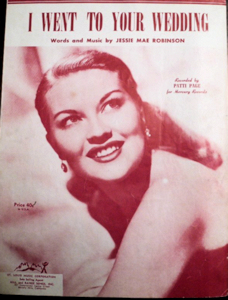Related Research Articles
Alberto Rabagliati was an Italian jazz singer.

"Singin' in the Rain" is a song with lyrics by Arthur Freed and music by Nacio Herb Brown. Doris Eaton Travis introduced the song on Broadway in The Hollywood Music Box Revue in 1929. It was then widely popularized by Cliff Edwards and the Brox Sisters in The Hollywood Revue of 1929. Many contemporary artists have since recorded the song.
"Wheel of Fortune" is a popular song written by Bennie Benjamin and George David Weiss and published in 1951. It is best remembered in the 1952 hit version by Kay Starr.
"Blue Tango" is an instrumental composition by Leroy Anderson, written for orchestra in 1951 and published in 1952. It was later turned into a popular song with lyrics by Mitchell Parish. Numerous artists have since covered "Blue Tango".
"I Don't See Me in Your Eyes Anymore" is a popular song, written by Bennie Benjamin and George David Weiss and published in 1949. The song was popularized that year by Gordon Jenkins and His Orchestra and by Perry Como.

"I Went to Your Wedding" is a popular song written and composed by Jessie Mae Robinson and published in 1952.
"Why Don't You Believe Me?" is a popular song written by Lew Douglas, King Laney, and Roy Rodde and published in 1952.
"Till I Waltz Again with You" is a popular song written by Sid Prosen.
"Too Young" is a popular song, with music written by Sidney Lippman and lyrics by Sylvia Dee. A recording of the song was released by Nat King Cole in 1951, which reached No. 1 in the United States and became the best-selling song of the year. The song was an early attempt by music labels to appeal to the younger demographics and its success later led to a boom of music that caters to the young. Another successful version was released by Donny Osmond in 1972.

"Hold Me, Thrill Me, Kiss Me" is a song written by Harry Noble and originally performed by Karen Chandler in 1952. It has been re-recorded several times since then, the most notable covers being by Mel Carter in 1965 and Gloria Estefan in 1994.
"You Belong to Me" is a popular music ballad from the 1950s. It is well known for its opening line, "See the pyramids along the Nile". The song was published in Hollywood on April 21, 1952, and the most popular version was by Jo Stafford, reaching No. 1 on both the UK and US singles charts.

"Blue (Da Ba Dee)" is a song by Italian music group Eiffel 65. It was first released in October 1998 in Italy by Skooby Records and became internationally successful the following year. It is the lead single of their 1999 debut album, Europop. The song is the group's most popular single, reaching number one in at least 18 countries, charting at number three in Italy, and peaking at number six on the US Billboard Hot 100 in January 2000.

"Vaya con Dios (May God Be With You)" (, literally "Go with God") is a popular song written by Larry Russell, Inez James, and Buddy Pepper, and first recorded by Anita O'Day in December 1952. Les Paul and Mary Ford had a No. 1 recording of the song in 1953. Members of the Western Writers of America chose it as one of the Top 100 Western songs of all time.
"Cold, Cold Heart" is a country music and pop song written and first recorded by Hank Williams. This blues ballad is both a classic of honky-tonk and an entry in the Great American Songbook.
"Tell Me Why" is a popular song written by Marty Gold with the lyrics by Al Alberts. The song was published in 1951.

"Somebody Loves Me" is a popular song, with music written by George Gershwin, and lyrics by Ballard MacDonald and Buddy DeSylva. The song was published in 1924 and featured in George White's Scandals of 1924.
"Somewhere Along the Way" is a popular song.
"Sideways" is a song written by American artist Clarence Greenwood, who is known by the pseudonym Citizen Cope. Although the song has never charted, it has been widely featured in pop culture. The song was included on Santana's 2002 album Shaman. Citizen Cope then included it in his 2004 album, The Clarence Greenwood Recordings. It has since been covered by Sheryl Crow, John Mayer, and Tyler James.
"On the First Warm Day". is an American pop standard with music and lyrics by Bart Howard. It was originally recorded by Rosemary Clooney for Columbia Records on April 18, 1952. Other performers with renditions of the tune over the succeeding decades include Mabel Mercer (1952), Alma Cogan (1953), Portia Nelson (1956), Chris Connor (1958), Eydie Gormé (1958), Betty Johnson (1995), KT Sullivan (1997) and Joyce Breach (2003).

Oliver Harrison is an English filmmaker, artist and animator. His films have been shown at film festivals around the world including Cannes Film Festival, New York Film Festival, San Francisco Film Festival and the London Film Festival. His feature film The Fallen Word premiered at the BFI Southbank in 2013. Influential in motion graphics, particularly in kinetic typography, Harrison's work has been featured at Tate Modern, The Barbican Centre and the Institute of Contemporary Arts.
References
- ↑ Whitburn, Joel (1973). Top Pop Records 1940-1955. Record Research.